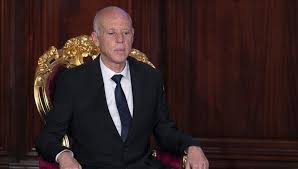In a move seen in some quarters as a power grab Tunisian President Kais Saied, has resorted to Article 80 of the country’s constitution to fire his prime minister and suspend parliament.
These measures are the consequence of the political crisis between the Tunisian president and Ennahdha, the majority party in parliament.
Faced with the “imminent danger,” the independent candidate, elected in the October 2019 presidential election used Article 80 of the constitution to assume direct control of state institutions.
The Islamist party Ennahdha in a statement published on Facebook condemned Kais Saied’s move as a “coup against the revolution and the constitution”.
However the president surrounded by army and police officials dismissed the coup allegation.
“It is neither a suspension of the constitution nor a departure from constitutional legitimacy, we work within the framework of the law,” he insisted.
Tunisia’s political crisis comes against the backdrop of the devastating effects of the coronavirus pandemic, which has hit the country hard since the fourth wave of infection was announced.
Tunisia is the African country most affected by the Delta variant with 550,000 infections and more than 18,000 deaths.
The country is struggling to take care of its Covid patients and faces a worrying shortage of oxygen and respirators.
Faced with the seriousness of the situation in Tunisian hospitals, a wave of international solidarity was quickly forged to save the country from the Covid precipice.
The World Health Organization (WHO) warned that the situation in Tunisia is “worrying,” given that 8,000 to 9,500 new infections and more than a hundred deaths are witnessed daily.
This prompted Kais Saied to announce what he called “exceptional measures” to save the country from further “tragedy.”
CD/te/fss/as/APA


